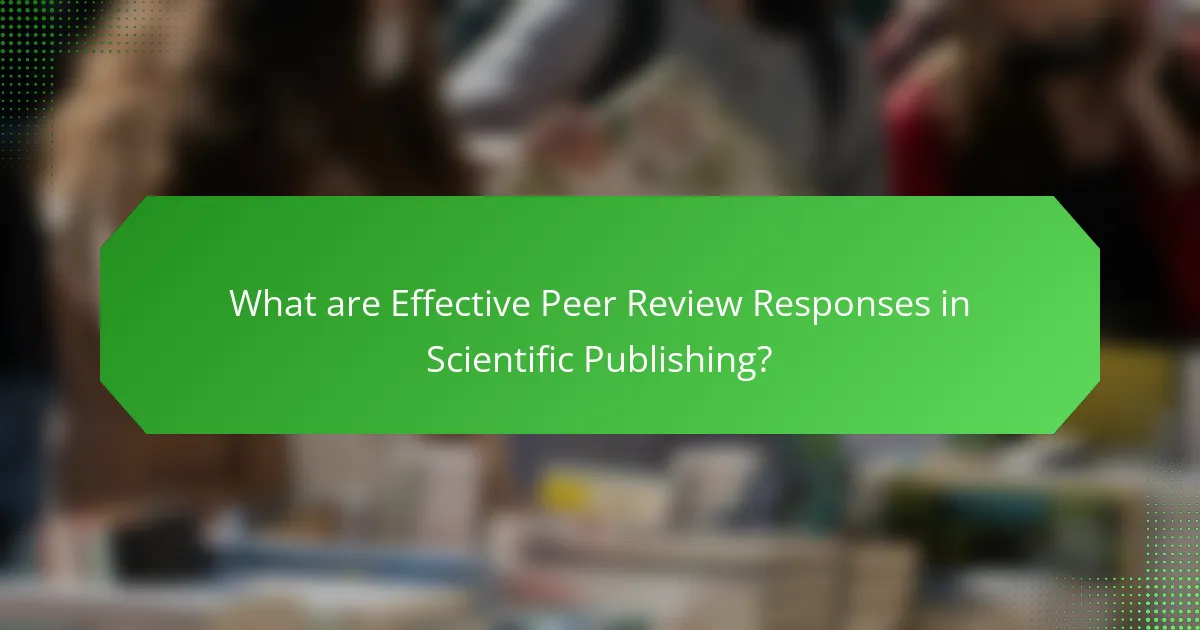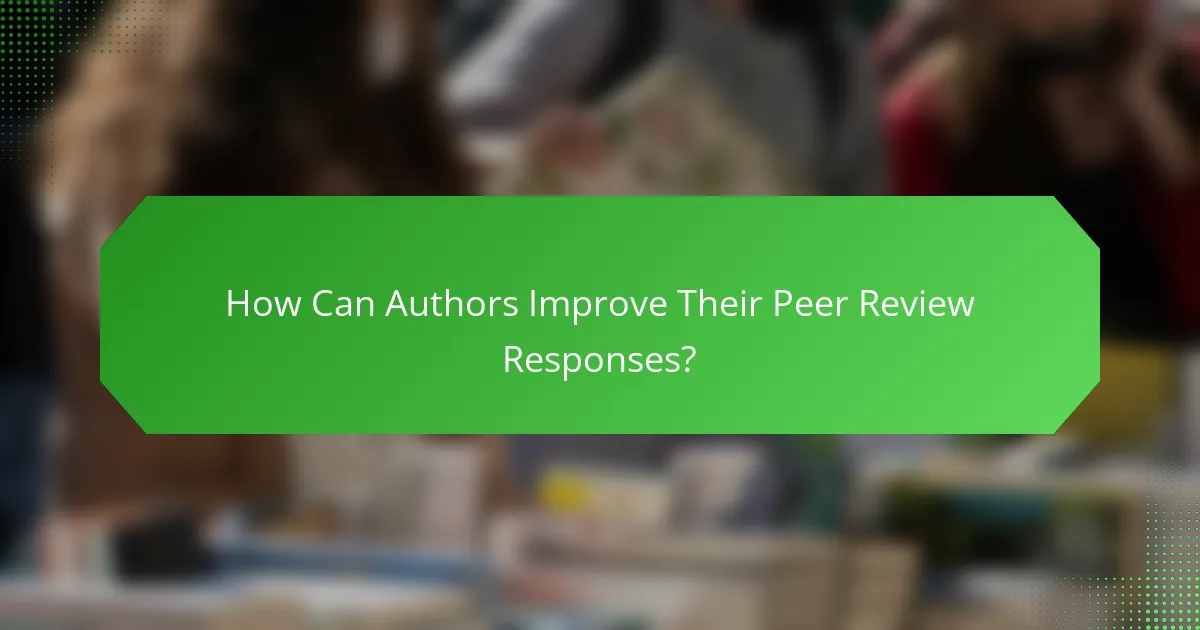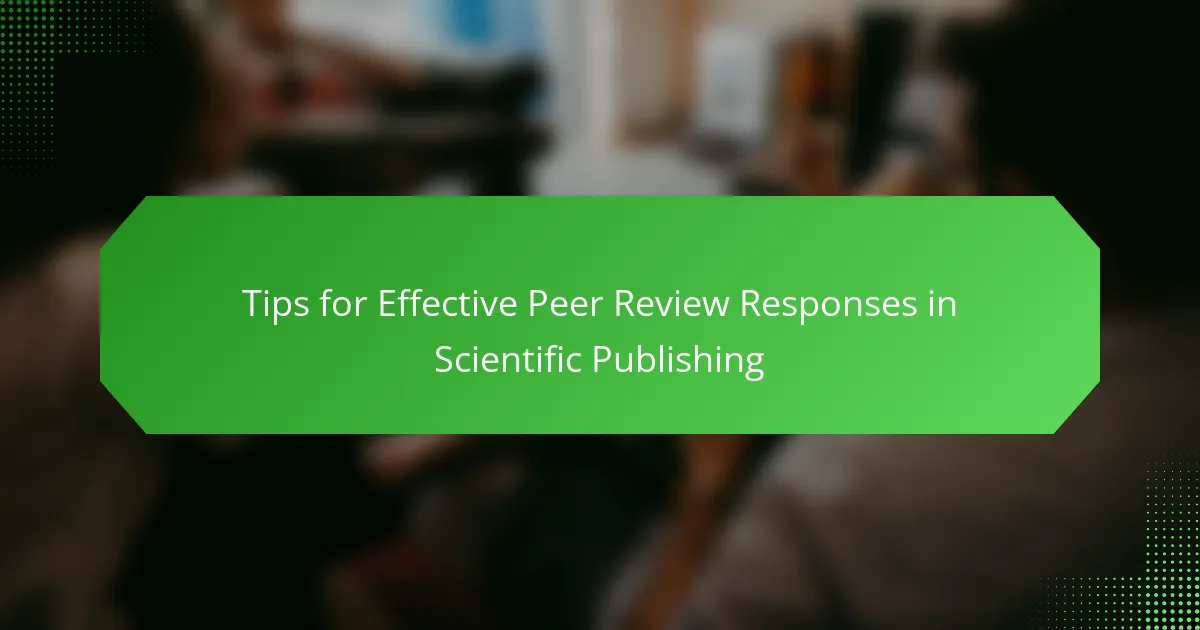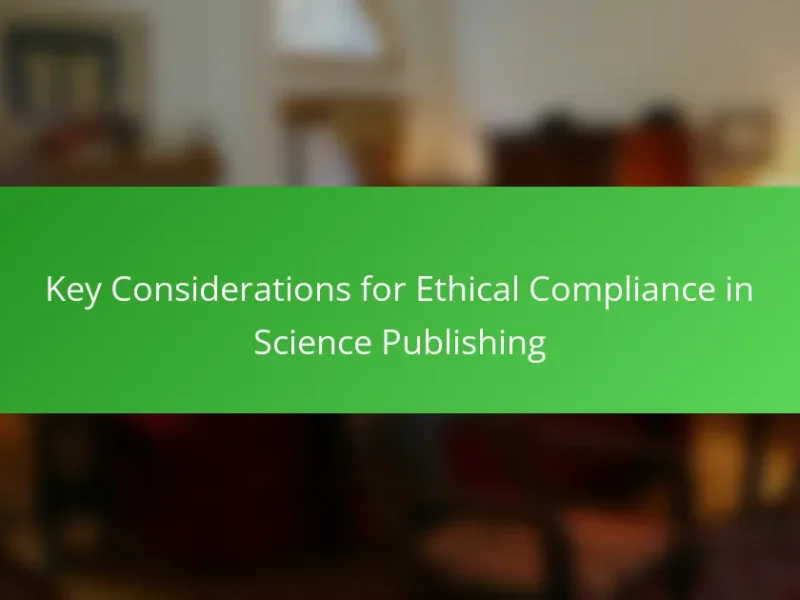Effective peer review responses in scientific publishing are structured and respectful replies to reviewer comments that enhance the manuscript’s quality and acceptance likelihood. This article outlines essential strategies for authors, emphasizing clarity, thoroughness, and professionalism in addressing reviewer feedback. Key practices include acknowledging comments, providing clear explanations for revisions, and justifying decisions against suggestions with evidence. Organizing responses systematically and maintaining a positive tone are crucial for fostering constructive communication. Timeliness in submitting responses is also highlighted as vital for adhering to publication timelines.

What are Effective Peer Review Responses in Scientific Publishing?
Effective peer review responses in scientific publishing are structured, respectful, and constructive replies to reviewer comments. They should acknowledge all feedback, addressing each point raised by reviewers. Clarity is crucial; responses must be easy to follow. Authors should provide specific explanations for changes made or justify decisions not to implement suggestions. It is important to maintain a professional tone throughout the response. Including references to relevant literature can strengthen the rationale behind the authors’ choices. Lastly, timely submission of responses is essential to maintain the publication timeline.
Why are Peer Review Responses Important in Scientific Publishing?
Peer review responses are essential in scientific publishing because they enhance the quality and credibility of research. They allow authors to address feedback, improving the clarity and rigor of their work. Constructive criticism from reviewers can identify flaws or gaps that authors may have overlooked. This iterative process fosters a more robust scientific discourse. Moreover, peer review responses contribute to the transparency of the publication process. They demonstrate that authors are willing to engage with the academic community. Ultimately, this leads to more reliable and validated research findings. Studies show that articles with thorough peer review responses are more likely to be cited, indicating their impact.
How do Peer Review Responses Impact the Publication Process?
Peer review responses significantly influence the publication process. They determine the acceptance, revision, or rejection of a manuscript. Constructive feedback from reviewers can enhance the quality of research. Authors address reviewer comments to improve clarity and rigor. This iterative process often leads to a stronger final publication. Positive peer review responses can expedite publication timelines. Conversely, negative responses may require extensive revisions, delaying publication. Ultimately, peer review responses are crucial for maintaining academic standards and integrity in scientific publishing.
What Role do Peer Review Responses Play in Scientific Collaboration?
Peer review responses play a critical role in scientific collaboration. They facilitate constructive dialogue between authors and reviewers. This exchange improves the quality of research by addressing weaknesses and enhancing clarity. Peer review responses help establish trust and credibility among researchers. They also promote transparency in the research process. Effective responses can lead to stronger collaborations and future research opportunities. Studies show that well-handled peer review interactions increase the likelihood of publication success. Thus, peer review responses are essential for fostering collaborative scientific environments.
What Common Challenges do Authors Face in Peer Review Responses?
Authors commonly face several challenges in peer review responses. One challenge is addressing conflicting reviewer comments. Reviewers may provide differing opinions, making it difficult for authors to know which feedback to prioritize. Another challenge is the emotional impact of criticism. Authors often feel discouraged by negative feedback, which can affect their motivation. Additionally, authors may struggle with time constraints. The peer review process can be lengthy, and authors need to respond promptly while ensuring quality. Lastly, authors may find it difficult to understand technical jargon. Reviewers may use specialized language that can confuse authors, complicating their responses.
How can Authors Address Negative Feedback in Peer Review Responses?
Authors can address negative feedback in peer review responses by acknowledging the reviewers’ comments. This shows respect for the review process. They should carefully analyze each piece of feedback. Identifying the key concerns raised by reviewers is essential. Authors can then provide clear, concise responses to each point. If they disagree with a comment, they should explain their reasoning respectfully. Providing additional evidence or references can strengthen their position. Revising the manuscript based on valid feedback demonstrates commitment to improvement. Ultimately, a constructive approach fosters better communication and enhances the quality of the work.
What Strategies Help Authors Manage Multiple Reviewer Comments?
Authors can manage multiple reviewer comments by organizing feedback systematically. They should categorize comments into major and minor issues. This helps prioritize responses effectively. Authors must address each comment individually in their response letters. They can summarize common themes across reviewers to streamline their replies. It is essential to maintain a respectful tone, even for critical feedback. Authors should clarify any misunderstandings in the comments to ensure accurate revisions. Lastly, keeping track of changes made in the manuscript can help authors respond confidently to reviewer queries.

How Can Authors Improve Their Peer Review Responses?
Authors can improve their peer review responses by addressing each reviewer comment thoroughly. They should acknowledge the feedback and express gratitude for the reviewers’ insights. Next, authors must provide clear, concise explanations of how they have revised the manuscript based on the comments. If an author disagrees with a suggestion, they should respectfully explain their reasoning and provide evidence to support their stance. It is also beneficial to organize responses in a structured format, aligning them with the reviewers’ comments. This method enhances clarity and ensures that all points are covered. Additionally, authors should avoid defensive language and remain professional throughout their responses. Effective peer review responses can lead to a smoother revision process and increase the likelihood of acceptance.
What Best Practices Should Authors Follow for Effective Responses?
Authors should provide clear and concise responses to peer review feedback. They must address each comment individually to ensure clarity. It is important to maintain a respectful tone throughout the responses. Authors should provide evidence or rationale for any disagreements with reviewer comments. This can include citing relevant literature or providing additional data. Authors should also acknowledge valid points made by reviewers and express gratitude for their insights. Timeliness in responding to reviews is crucial for maintaining the publication timeline. Overall, these practices enhance the quality of the manuscript and facilitate constructive dialogue with reviewers.
How can Clarity and Conciseness Enhance Peer Review Responses?
Clarity and conciseness enhance peer review responses by improving understanding and engagement. Clear responses allow reviewers to grasp key points quickly. Concise language reduces ambiguity and ensures that feedback is direct. This approach fosters better communication between authors and reviewers. Research indicates that clear and concise writing increases the likelihood of constructive feedback. A study published in the Journal of Scholarly Publishing confirms that clarity in peer reviews correlates with higher satisfaction from authors. Therefore, clarity and conciseness are essential for effective peer review communication.
What Tone Should Authors Use in Their Peer Review Responses?
Authors should use a professional and respectful tone in their peer review responses. This tone fosters constructive dialogue between authors and reviewers. It is important to acknowledge the reviewers’ feedback, regardless of whether the authors agree with it. Authors should express gratitude for the reviewers’ time and insights. Clarity and conciseness are essential to ensure effective communication. A positive tone can help in addressing concerns and suggestions. This approach enhances the likelihood of a favorable outcome in the review process. Research indicates that authors who engage respectfully with reviewers tend to receive more constructive feedback in return.
What Tools and Resources are Available for Authors to Enhance Their Responses?
Authors can enhance their responses using various tools and resources. Writing software like Grammarly improves grammar and style. Citation management tools such as Zotero help organize references. Online platforms like ResearchGate allow for collaboration and feedback from peers. Workshops on scientific writing provide essential skills. Publishing guidelines from journals offer clarity on expectations. Resources like the “Publication Manual of the American Psychological Association” provide comprehensive writing standards. These tools collectively aid in crafting clear and effective peer review responses.
How can Software Assist in Organizing Peer Review Feedback?
Software can assist in organizing peer review feedback by centralizing comments and suggestions. It allows users to collect feedback from multiple reviewers in one platform. This organization streamlines the review process and enhances clarity. Features like tagging and categorization help in identifying key themes. Some software offers automated summaries of feedback for quick reference. Additionally, tracking changes and comments can provide a clear history of revisions. Tools often include collaborative features for real-time discussion among authors and reviewers. Overall, these functionalities improve efficiency and communication in the peer review process.
What Resources Provide Guidance on Writing Peer Review Responses?
Resources that provide guidance on writing peer review responses include academic journals, writing centers, and online platforms. Journals often publish guidelines for reviewers, detailing expectations and best practices. Writing centers at universities offer workshops and materials on effective communication in academic writing. Online platforms like ResearchGate and Academia.edu feature forums where researchers share experiences and tips on peer review. Additionally, books on scholarly publishing provide comprehensive insights into the peer review process. These resources collectively help authors craft constructive and professional responses to peer reviews.

What are the Key Takeaways for Successful Peer Review Responses?
Key takeaways for successful peer review responses include clarity, respect, and thoroughness. Clarity ensures that reviewers understand the author’s points. Authors should address all comments systematically. Respectful language fosters positive communication. Acknowledging feedback shows willingness to improve. Thoroughness in responses demonstrates engagement with the review process. Providing evidence or references strengthens arguments. Timeliness in responses reflects professionalism. These practices enhance the quality of the manuscript and the peer review process.
What Final Tips Can Authors Implement for Effective Peer Review Responses?
Authors should respond to peer reviews with clarity and respect. Acknowledge each reviewer’s comments individually. This shows appreciation for their input. Provide a point-by-point response to each critique. This structure enhances readability and comprehension. Use a polite tone throughout the response. This helps maintain a positive relationship with reviewers. If disagreeing with a comment, explain your reasoning clearly. This demonstrates professionalism and thoughtfulness. Revise your manuscript based on feedback when possible. This shows willingness to improve your work. Finally, express gratitude for the reviewers’ time and effort. This fosters goodwill in the peer review process.
How can Authors Cultivate a Positive Relationship with Reviewers?
Authors can cultivate a positive relationship with reviewers by maintaining professionalism and open communication. They should respond to reviewer comments thoughtfully and respectfully. Acknowledging the reviewers’ expertise fosters goodwill. Authors must address all feedback comprehensively, demonstrating a willingness to improve their work. Expressing gratitude for the reviewers’ time and insights can enhance rapport. Timely responses to reviews show respect for the reviewers’ schedules. Providing clear explanations for any disagreements with feedback helps clarify positions without appearing defensive. These practices contribute to a constructive and collaborative review process, ultimately benefiting the quality of the research.
What Common Mistakes Should Authors Avoid in Peer Review Responses?
Authors should avoid being defensive in peer review responses. Defensiveness can alienate reviewers and hinder constructive dialogue. Authors should also avoid ignoring reviewer comments. Each comment offers valuable insights for improving the manuscript. Additionally, authors should not provide vague responses. Specificity enhances clarity and demonstrates engagement with the feedback. Authors should refrain from dismissing criticism without justification. Acknowledging valid points fosters a collaborative atmosphere. Lastly, authors should avoid excessive length in their responses. Concise replies respect reviewers’ time and maintain focus on key issues.
The main entity of the article is “effective peer review responses in scientific publishing.” This article provides guidelines for authors on how to craft structured, respectful, and constructive responses to reviewer comments. It highlights the importance of clarity, timeliness, and professionalism in these responses, as well as strategies for addressing negative feedback and managing multiple reviewer comments. Additionally, the article discusses common challenges faced by authors and best practices to enhance the quality of peer review interactions, ultimately contributing to improved research credibility and publication success.


